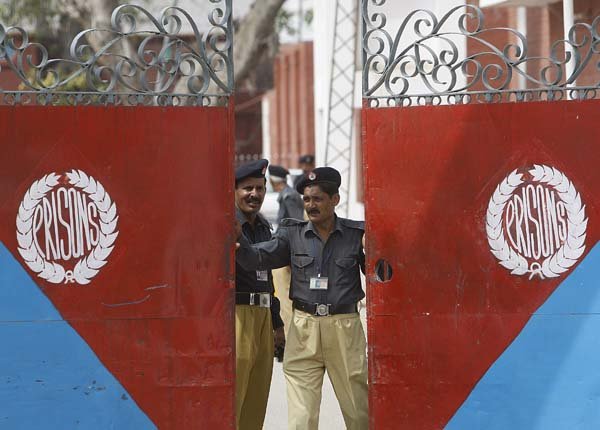SARGODHA, Pakistan — Five Virginia men were convicted on terror charges and sentenced to 10 years in prison Thursday by a Pakistani court in a case that intensified U.S. concern about its citizens linking up with foreign extremist groups.
A defense attorney for the men questioned the legitimacy of the verdict and accused prosecutors and the judge in the closed trial of ignoring key evidence. He promised an immediate appeal.
In Alexandria, Va., the families of the five men were said to be reeling from news of the convictions.
“They had hoped for justice and are devastated by the results,” said Alexandria attorney Nina Ginsberg, who is working with the men and their families in the face of potential prosecution by the U.S. government and has closely followed the Pakistani court proceedings. “This was a rigged trial that appears to have been based on fabricated evidence in a secret court with a preordained result.”
The men - Umar Farooq, Ramy Zamzam, Ahmed A. Minni, Waqar Khan and Aman Hassan Yemer - were convicted of criminal conspiracy and funding a banned terror organization. The charges carry sentences of 10 and five years, respectively, but the judge ordered the sentences served concurrently.
The five were acquitted of three other charges, including planning to wage war against the U.S. and Afghanistan.
The men range in age from late teens to mid-20s.
Prosecutors said e-mail records and witness statements proved the men were plotting terror attacks in Pakistan and had conspired to train for and execute attacks against U.S. troops stationed in Afghanistan.
But defense attorneys in Pakistan said some of the emails submitted as evidence of communication with terror groups did not have date stamps and could have been fabricated by overzealous local police officials once the five were already in custody.
Lawyer Hassan Katchela also questioned the submission of two receipts for relatively small amounts of money - 500 and 1,000 Pakistani rupees, or about $6 and $12 - as evidence that the men had given money to terror groups.
“The evidence that we had produced in the court was not even read,” Katchela said.
The men grew up in the Alexandria area and worshipped at the same small mosque. They said during trial that they traveled secretly to Pakistan in hopes of helping the orphaned and homeless in neighboring Afghanistan. When they were arrested in December, after their families reported them missing, they ranged in age from 18 to 24.
Katchela said the men were “shocked” and “very disappointed” when the verdicts were announced in court. In addition to the prison sentences, they were each fined 70,000 Pakistani rupees - about $840.
“They remained silent and left the courtroom silently,” Katchela said, adding that he expected to meet with the men today and discuss an appeal to a higher court in Lahore, which he plans to submit within seven days.
“We feel they’ll have a better chance at a fair trial in Lahore, where a local court doesn’t have to rule that its own local investigators fabricated evidence,” Ginsberg said.
Deputy prosecutor Rana Bakhtiar said outside the Sargodha jail that the government also would appeal and probably would seek 20-year prison terms for the men.
In the United States, the FBI is conducting its own investigation into the men’s activities. Investigators have been waiting to see how events play out in Pakistan, partly because evidence from the trial there could give them more leads to follow, U.S. law enforcement officials said.
It is unclear whether the men also will face charges in an American court, though officials said the verdict in Pakistan will have little bearing on that decision.
As news of the conviction filtered out Thursday morning, Nihad Awad, executive director of Council on American-Islamic Relations, spoke by phone with the parents of the five men, most of whom live in a small community near their mosque, the ICNA Center. “They are in a state of shock,” Awad said.
When the families first discovered that their children had vanished, around Thanksgiving last year, they contacted Awad and showed him a farewell video left by Zamzam, the eldest of the group. Awad and others at the council urged the families to contact the FBI and begin searching for their sons. Soon after, the young men were arrested in Pakistan.
The men’s relatives said later that they had no inkling of the men’s activities before they disappeared.
Lawyers alleged that the men were mistreated by their Pakistani jailers in order to coerce confessions - allegations Pakistani officials denied.
The father of Umar Farooq, Khalid Farooq, was in Sargodha for the trial and said he was “disappointed” by the verdict. “I don’t know where is justice,” the elder Farooq said.
Khalid Farooq, who was initially arrested along with his son and the other young men, told The Washington Post after the arrests that he and his wife tried to raise their children to absorb the best values of both Pakistan and America.
He said he was worried the combination might have been confusing for Umar.
State Department spokesman Mark Toner said Thursday that the U.S. respects the Pakistani justice system, but it was too early to assess whether the trial was fair because the appeals process is still to come.
“But we have continued to provide consular assistance to these U.S. citizens throughout, and a consular officer attended the court hearing,” Toner said in Washington.
The verdict comes just days after Pakistani-American Faisal Shahzad pleaded guilty to trying to bomb New York’s Times Square in May after being trained by the Taliban in Pakistan’s tribal areas.
Information for this article was contributed by Jerry Markon and Karin Brulliard of The Washington Post and by Zarar Khan, Munir Ahmed, Nafeesa Syeed and Matthew Lee of The Associated Press.
Front Section, Pages 1 on 06/25/2010
